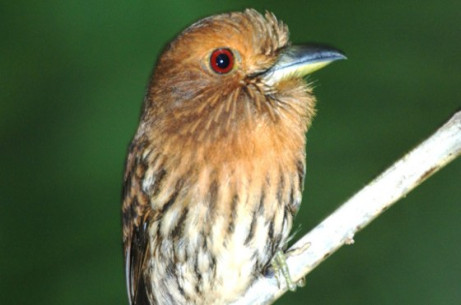
Corina Logan is co-author of a study on tropical birds' ability to plan for the future.
Certain types of birds may track army ant swarms using sophisticated memory and the ability to plan for the future, according to new research co-authored by a Gates scholar.
Some tropical birds collect their prey at army ant raids, where massive swarms of ants sweep through the forest and drive out insects. The behaviour of interest is called bivouac checking; it allows these birds to track the cyclical raid activity of army ant colonies.
Army ants have regular alternating periods of high and low raiding activity, and birds visit the ants’ temporary nest sites (bivouacs) to determine which colonies are raiding on a given day.
The new findings published today in the journal Behavioural Ecology, suggest that bivouac checking allows birds to keep track of multiple army ant colonies, keeping account of which colonies are in periods of high-raiding activity while avoiding colonies with low-raiding activity.
Recent research has discovered that birds check army ant bivouacs at the end of the day, after they have fed at the raid. They may use the information about the army ant nest location the next day to find the ants again, thus accessing a past memory (the nest location) to fulfil a future need (bird will be hungry tomorrow), also known as ‘mental time-travel’.
Two of the authors of the study Corina Logan [2008], and Sean O’Donnell of the University of Washington, observed bivouac checking behaviour in Monteverde, Costa Rica.
Mental time-travel consists of two elements: the ability to remember past events and the ability to anticipate and plan for future events. It has traditionally been considered a quality unique to humans. However, ever since Nicola Clayton of the University of Cambridge discovered that scrub jays (a species of large-brained crow) can remember the past and plan for the future, there have been a suite of studies showing evidence of this ability in other species as well. We now know that corvids (birds in the crow family), some primates, and possibly rats have all shown the ability to remember the past and plan for the future.
Corina Logan said: “We suspect that future planning could be involved in bivouac-checking bird behaviour because the birds were checking bivouacs when they were not hungry, a behaviour that does not make sense until the next morning upon return to the bivouac when the bird finds the ants raiding again and encounters its next meal – a delayed benefit.”
Until recently, it has been difficult to find model systems for studying mental time travel in an ecologically relevant way. “The fact that we might have happened on a whole new system for exploring these capacities is quite exciting,” added Corina, who is completing a PhD in Experimental Psychology.
Photo credit: Glenn M Duggan FZS












